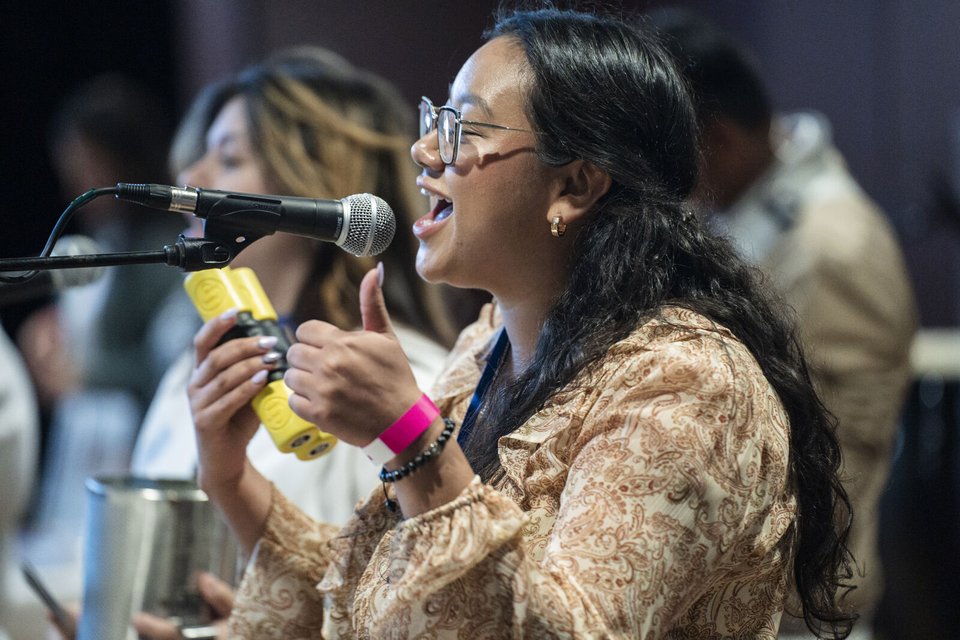WASHINGTON (CNS) -- The president of SIGNIS urged the world's bishops as the "chief storyteller" in their diocese to use all media at their disposal to "make known" stories "of faith and hope" and of local Catholic heroes who exemplify Christ's love to give people courage in "difficult times," like this current pandemic.
Catholic media outlets also can provide "basic tools" to the faithful "to spot" false stories, such the narratives about the "Chinese" virus causing the pandemic and rumors of "dangerous fake cures," said Helen Osman, who heads SIGNIS, the World Catholic Association for Communication, based in Brussels.
She made the comments in a statement issued ahead of World Communications Day, which is May 24. A former diocesan editor and former communications secretary for the U.S. Conference of Catholic Bishops, Osman is currently a communications consultant for the Texas Conference of Catholic Bishops in Austin.
Pope Francis' message for this year's World Communications Day is: "That you may tell your children and grandchildren" (Ex 10:2): Life becomes history."
The pope "reminds us of the importance of the stories we tell, especially in the midst of the din of media that leave us feeling dislocated," Osman said. "The narratives that we live by must reflect the vision of the interconnectedness of all human life."
SIGNIS is "urging our members to see as a moment of grace this unique passage: Faced with a pandemic, we are called to create a narrative that can change lives and history itself," Osman continued. "With their fellow Catholics and all people of goodwill, they can weave a story worth telling those who come after us, one that will stir their hearts and give them courage when they inevitably face their most difficult times.
"Our Catholic tradition is an ongoing story that must be renewed with each generation," she added.
Osman offered several questions for bishops to reflect on, in hopes they "will be of use to you pastorally" and in telling the story of the Catholic Church. These questions, she said, flow from the pope's message for World Communications Day and SIGNIS members are reflecting on them as well, she added.
First, she said, Pope Francis "notes that 'not all stories are good stories.' In our time there are those who seek to exploit others or to confuse so that the very notion of truth is in doubt. Their technological savvy produces damaging false narratives that do great harm."
So, "what are the basic tools we offer our people to be able to spot these false stories, which spread like a virus themselves?" Osman asked. "And better, how do we tell stories of faith and hope so they become the enduring narrative, the antibody to a plague of deception and lies?"
Osman pointed to stories that blame the pandemic on a "Chinese virus," which has led to attacks on Asian people, and that spread "rumors of dangerous fake cures" for COVID-19.
"The poor and the marginalized, especially migrants and other people on the move, suffer the most, as they are exploited and literally put in harm's way so that others may be spared the brunt of the pandemic and our efforts to mitigate its effect on economic life," she said.
Next, "if we believe, as the Holy Father says, that the great storyteller became flesh in our human history, then every person has the potential to be a vital character in the story of salvation," Osman stated.
"We are seeing that in our day in the heroic actions of doctors, nurses, first responders, and in the seemingly mundane actions of those we often have failed to even notice: sanitation and cleaning workers, grocery clerks, and farmworkers. All of them risk their lives to keep us healthy and fed," she said.
On this point she offered these questions for reflection: "What are the stories in your diocese of these heroes that you can hold up as examples of Christ's love incarnated in your communities? And how do you spread these stories? What media is at our disposal to make them known?"
She continued, "The pope reminds us that the Holy Spirit writes the story of God's love on the human heart."
"Many of the stories that relate to the experience of people today are told in secular media, printed and otherwise. In some cultures, the role of traditional storytellers serves the same role," Osman said. "In all cases, their power derives from their affirmation of deeper truths of the human condition, especially the enduring strength of love."
"How do you offer guidance to your people to see and reflect on the truth where it may be found in the media, arts, and in local traditions, perhaps in places they may not expect it?" she asked the bishops.
Osman acknowledged many dioceses already have "robust plans to celebrate World Communications Day," but hoped the questions she raised "may further enhance these initiatives."
She said SIGNIS has resources at its website to help with diocesan celebrations, www.signis.net, and also urged bishops to look at how their diocese might collaborate with local organizations and educational institutions that foster media literacy.
These organizations "share with the church the desire to embrace the truth that sets us free," Osman added.









